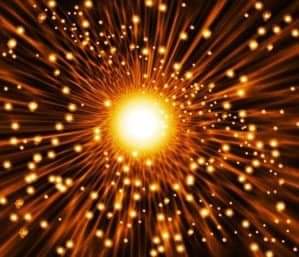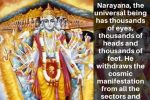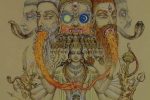Name 95
95. Ajaḥ अजः
This nāma is repeated as nāmas 204 and 521.
He has no parentage. Only the Brahman has no parentage. Brahman is beyond modification. The One, who is beyond modification and is eternal.
Aja also refers to Prakṛti, where māyā prevails. Prakṛti is the creation of the Brahman and māyā is the projecting power of the Brahman that prevails in Prakṛti, causing ignorance and illusion. Kṛṣṇa explains this in Bhagavad Gītā (IV.6), “Though I am eternal, indestructible and Lord of all living beings, abiding in my Prakṛti, I manifest due to my yoga māyā.
Ajah – One who has no birth
This Nama appears 3 times in Vishnu Sahasranamam. The word Ajah has several meanings. The more common meanings can be summarised as below:
One who is Unborn or never born;
One who is The Remover of all obstacles;
One who moves in the hearts of His devotees;
One who removes the ignorance from the hearts of His devotees; and
One who is the root of all sound (akshara “a”)
The first meaning is explained by Sri Adi Sankara by saying ‘Na Jaayate iti Ajah – Since he is not born (He is without a beginning) He is Ajah. Rig Veda says ‘Na Jaato Na Janishyate – Was never born, will never be born’.
In the Mahabharata Santi Parva, the following verse says:
“na hi jaato na jaayeyam na janishye kadaachana |
kshetrajnah sarvabhootaanaam tasmaat aham ajah smrtah ||
I was not born, nor am I being born, nor will I be born in the future. I am the soul in all beings; hence I am called the Unborn.”
Sri Parasara Bhattar points out that even though Bhagavan might have taken several Avatars, they are not to be equated with normal births.
The root ‘aj’ signifies movement or throwing away. Sri Bhattar uses this meaning and interprets the Nama as “The Remover of all obstacles”; He ensures that His devotees accomplish their objective of reaching Him.
Sri Adi Sankara uses the same meaning for aja (movement, motion) and comes up with a different explanation – ajati gacchati kshipati iti vaa ajah – He who moves into the heart of His devotees.
Sri Radhakrishna Shastri uses the meaning “movement” and interprets the Nama as remover of ignorance in us, or One who goes to the bhaktas to enable them to reach Him, or One who unleashes His weapons on anyone who disturbs or causes hardship to His devotees.
Bhagavad Gītā – Chapter – 4
Ajo’pi sannavyayātmā bhūtānāmīśvaro’pi san,
Prakr̥tiṃ svāmadhiṣṭhāya saṃbhavāmyātmamāyayā. (6)
:: श्रीमद्भगवद्गीता – ज्ञान योग ::
अजोऽपि सन्नव्ययात्मा भूतानामीश्वरोऽपि सन् ।
प्रकृतिं स्वामधिष्ठाय संभवाम्यात्ममायया ॥ ६ ॥
Unborn though I am, of changeless Essence! Yet becoming Lord of all creation, abiding in My own Cosmic Nature (Prakr̥ti), I embody Myself by Self-evolved māyā-delusion.
जातस्य हि ध्रुवो मृत्युर्ध्रुवं जन्म मृतस्य च |
तस्मादपरिहार्येऽर्थे न त्वं शोचितुमर्हसि || 27||
jātasya hi dhruvo mṛityur dhruvaṁ janma mṛitasya cha
tasmād aparihārye ’rthe na tvaṁ śhochitum arhasi
BG 2.27: Death is certain for one who has been born, and rebirth is inevitable for one who has died. Therefore, you should not lament over the inevitable.
Commentary
In English language, there is a popular idiom, “as sure as death.” Benjamin Franklin said: “The only things certain in life are death and taxes.” The most certain thing in life is that we will meet with death one day. Psychologists categorize the fear of death as the biggest fear in life. In Patanjali’s Yog Darśhan too, abhiniveśh, or the instinctive urge to survive at all costs, is mentioned as a trait of the material intellect. But for one who has taken birth, death is inevitable. So when something is inevitable, why lament over it?
The Mahabharat relates an incident regarding this. During the period of their exile in the forest, one day while wandering the five Pandavas were thirsty and came across a well. Yudhishthir asked Bheem to go and fetch water for all of them. When Bheem reached the well, a yakṣha (powerful spirit) began speaking from inside the well, “I will only let you take the water if you first answer my questions.” Bheem paid no heed and proceeded to draw water. The yakṣha pulled him in. After some time when Bheem did not return, a concerned Yudhishthir sent Arjun to see what was happening and fetch water. When Arjun reached the well, the yakṣha asked him too, “I have already seized your brother. Do not attempt to draw the water unless you can answer all my questions correctly.” Arjun also paid no heed, and the yakṣha pulled him into the well. The other brothers, Nakul and Sahadev, followed him, but met with the same fate. Finally, Yudhishthir himself came to the well. Once again, the yakṣha said, “Answer my questions if you want to drink water from the well, or I will pull you in, just as I have done to your four brothers.” Yudhisthir agreed to answer the questions. The yakṣha was actually the celestial God of death, Yamraj, in disguise. He asked sixty questions, each of which was answered perfectly by Yudhishthir. One of these questions was: kim āśhcharyaṁ? “What is the most surprising thing in this world?” Yudhisthir replied:
ahany ahani bhūtāni gachchhantīha yamālayam
śheṣhāḥ sthiratvam ichchhanti kimāśhcharyamataḥ param (Mahabharat) [v30]
“At every moment people are dying. Those who are alive are witnessing this phenomenon, and yet they do not think that one day they will also have to die. What can be more astonishing than this?” Shree Krishna explains in this verse that life is inescapably a dead end, and so a wise person does not lament over the inevitable.
९५. ॐ अजाय नमः |
95. OM Ajāya namaḥ
Ajah -Unborn. Birth implies a modification; birth cannot be without the death of its previous condition. Since the Eternal and the Infinite, is ever Changeless there can be in It neither birth nor death. That which is born must necessarily die: -(Geeta Ch. 2, St. 27) and so, that which is unborn should be deathless (Amritah).
Rig Veda (1-81-5): “He was neither born nor is He going to be born.”
Na jāyate iti / न जायते इति He is not born vide the Sruti ‘Na jāto na janiṣyate’ (R̥gveda 1.81.5) – ‘is not born nor will be born’.
INTERPRETATION GUIDED BY SANT VANI (WORDS OF SAINTS)
Ajaḥ (also names 204, 521)
The unborn.
He, who has no birth – unborn and never ever born.(Śaṅkara) He who removes the obstacles which prevents the Jīvas from attaining him. He who throws away the obstacles that mask “Him” from ‘them’(Parāsara Battar).
The one who is not born is aja. One may think, that what is not born cannot exist. It should be non-existent like the vandhyā putra, the son of a barren woman.
Aja means unborn and hence, He does not have death nor changes like growth, modifications and decay. In short, the Lord is not bound by time.
Further, it negates the idea that it may be a non-existent thing by saying: ‘I am the ksetrajña (knower of all the fields, bodies) in all beings and hence I am known as Aja’( B.Śān.342.74).
The Bhagavad Gītā (2.20) and the Kaṭhopaniṣhad (1.2.18) also makes this clear by saying, He is aja, unborn; nitya, not subject to death, śāśvata, not subject to change or decay, purāṇa, not subject to growth. Aja refers to the svarūpala ṣaṇa, the very nature of Īśvara and also the nature of ourselves. Bhagavān says that there is no valid reason to grieve as the being can and will never be killed. Then what is subject to death? The body. Is it absolutely real? No. Beingness that is aja, never born is what lends its reality to the body-mind.
The Rig Veda(01.081.07; Mandala. Sukta. Rik) talks about the Supreme being as one who is not born and will never be born – essentially meaning that he is beyond the normal cycle of birth-death-birth:
आ प॑प्रौ॒ पार्थि॑वं॒ रजो॑ बद्ब॒धे रो॑च॒ना दि॒वि ।
न त्वावाँ॑ इंद्र॒ कश्च॒न न जा॒तो न ज॑निष्य॒तेऽति॒ विश्वं॑ ववक्षिथ ॥
ā ǀ paprau ǀ pārthivam ǀ rajaḥ ǀ badbadhe ǀ rocanā ǀ divi ǀ
na ǀ tvā-vān ǀ indra ǀ kaḥ ǀ cana ǀ na ǀ jātaḥ ǀ na ǀ janiṣyate ǀ ati ǀ viśvam ǀ vavakṣitha ǁ
While several earlier names hinted at and were interpreted to mean “He who is the unborn, unchanging, and undying eternal being of the world” this is the first name that clearly calls that Supreme being as that person who is never born and will never be born.
Bhagavān makes it clear in the Mahābhārata by saying, ‘I was not born, nor am I born, nor will be born’. One may immediately assume that God is nothingness because we have not come across any such object or person. We know that even our bodies are subject to death. Then does it mean that, perhaps the Lord is unborn but can certainly die. No.
In the Shanti-Parva of the Mahābharata, Kṛṣṇa himself reveals once again, not only his true nature but also specifically uses the word Ajaḥ and states that he is the one who never is born nor takes birth, and that he is the Kṣetrajña (the knower of the ‘field’ i.e. the human body) who dwells within each being:
——-Quote
I was never born. I never take birth. Nor shall I ever be born. I am the Kṣetrajña of all creatures. Hence am I called by the name of Aja (unborn). I have never uttered anything base or anything that is obscene. The divine Saraswati who is Truth’s self, who is the daughter of Brahma and is otherwise called by the name of Rita, represents my speech and always dwells in my tongue. The existent and the non-existent have been merged by me in my Soul. The Rishis dwelling in Pushkara, which is regarded as the abode of Brahman, called me by the name of Truth. I have never swerved from the attribute of Sattwa, and know that the attribute of Sattwa has flowed from me. In this birth also of mine, O Dhananjaya, my ancient attribute of Sattwa has not left me, so that in even this life, establishing myself on Sattwa, I set myself to acts without ever wishing for their fruits.
—–Unquote
Further, this name also dovetails perfectly with the previous name of the earlier string – Sarva-darśanaḥ – he whose eyes are everywhere, who sees everything and is also the ‘knower’ of all the Darśanas (philosophical schools) of Sanatan Dharma. It is because he is Ajaḥ that he is the Sarva-darśanaḥ.
Many of our historians try to ‘date’ our Vedas on the presumption that they were “written” by someone from our ancient past. The Dharmic standpoint however is that the Vedas/Darśanas were never written by anyone because the truths embedded in them are eternal that have always existed and came into the world along with the Supreme Being when he decided to exhale the Universe into existence – we saw this when discussing the name Saṃvatsaraḥ where one breath of Viṣṇu has caused these multiple Universes to come into being. None of these truths are the imaginations of someone but rather revelations that the Sages saw in deep meditative states – that is why they are Darśanas and those who saw these truths in their mind’s eye are called Draṣṭās (Seers), who saw these truths when the Supreme Being decided to reveal himself to that Seer. They then in turn transmitted these truths to their disciples and/or compiled them for the benefit of the people.
In fact the Dharmic standpoint is that the Vedas (which form the fundamental substratum from which the various other texts are drawn from) are the breath of that Supreme Being. In the Bṛhadāraṇyakopaniṣad, it is said that the Vedas were exhaled by that Supreme Being – the word used being “Nisvasitam” – just as the Supreme Being is eternal and unborn, so also is this Dharma and hence is it Sanātana dharma – the eternal Dharma – ever-living and never-dying. Therefore he is Ajaḥ and so also is the Dharma through which he can be attained.
The Pandavas were firm in their resolve to renounce their Kingdom and began the ascent of the Himalayas as part of their final journey. Yudhisthira led the way followed by Bheema, Arjuna, Nakula, Sahadeva and Draupadi. A dog also accompanied them through their journey.
No matter who we are or what we have done, when time comes, we all shall fall for one reason or the other, that we held very dear.
Now only Yudhisthira and the dog were left, continuing the journey onwards together.
Ah! Maybe Yudhisthira was a Bodhisattva.
Parāsara Battar interprets this name to mean “He who reveals himself to his devotees” – This is also true. Only when Viṣṇu decides does he reveal himself to the devotee. He might shower his blessings and grace but it is only the select-few who get to see and realize him for who he actually is. Even the veil that is drawn over our mind’s eye that prevents us from realizing him is an act of compassion by that Viṣṇu who knows when we are ready to receive him across our physical, emotional, mental, and spiritual domains. Till the time he decides to remove the veil we shall wait…
In Lalitha Sahasranama Divine Mother’s is referred to as Ajakshaya vinirmukta mugdha kshipra prasadini Antarmukha samaradhya bahirmukha sudurlabha.
Ajaya: For whom there is no birth. Kshaya vinirmukta: Whom there is no decay also. Mugdha: Who is attractive by her artless beauty and innocence. Kshipra prasadini: Who is easily pleased. Antarmukha samaradhya: Whose worship is easy for those whose, mental gaze is turned inward. Bahirmukha sudurlabha: Whose worship difficult for those whose mental gaze goes outwards.
PLEASE WATCH
Recommended listening and re listening in its entirety.



